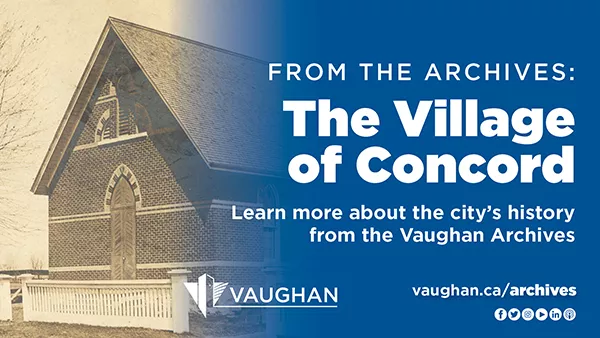From the archives: The Village of Concord
Learn more about the
city’s history from the Vaughan Archives
From the traditional territories of the First Peoples of Turtle Island, to a farmland community, to a bustling city centre and everything in between – Vaughan’s transformation is a story worth telling. As part of a monthly series, the City of Vaughan is releasing historical content from the Vaughan Archives, Office of the City Clerk. Citizens are encouraged to scroll through memory lane, learn about the city’s past and explore the places, people and events that were pivotal to the development of the city of Vaughan we know today. This month, the City is highlighting the history of the Village of Concord.
The Village of Concord was settled by several families, including the White and Oster families, who helped establish many businesses in the area.
Hiriam White, who emigrated from Vermont to Vaughan in 1818, helped name the community after his hometown in Concord, Vermont.
In 1846, Peter Oster emigrated to Concord from Penslyvania and built a store on the southeast corner of Lot 6, Concession 3, which is now known as the intersection of Keele Street and Centre Street. After Mr. Oster had finished construction, the store was then occupied by Richard Love until 1853. It became the Concord Post Office in 1854, with John Duncan serving as the first postmaster. The post office continued to operate for more than a century until it was replaced by Canada Post in 1981.
The first blacksmith shop in Concord was opened in 1846 by Isaac White on the corner of Lot 8, Concession 3, which is now occupied by the Canadian National Railway’s Macmillan Yard. When Mr. White left, the blacksmith shop was taken over by Thomas Keys, Aut Brillinger, Jim Fisher, Fred Minton and George Fox. The building was torn down in 1945. Just south of the blacksmith, near the road, there stood a small two-story building that was used as a paint shop for the buggies and wagons made at the blacksmith.
ABOUT VAUGHAN ARCHIVES
Established in 1988,
the City of Vaughan
Archives
is home to more than 600 collections, consisting of both City records and cultural
records about Vaughan from 1860 to present day. Records include, but are not
limited to, the following:
- City business records with long-term legal and administrative value, such as Council meeting minutes, by-laws, assessment rolls, financial records, reports and official correspondence
- church, community and school records
- census records
- historical photographs
- land records
- historical maps, plans and aerial photographs
- newspapers
- personal papers of past residents and founding families, such as diaries, family histories, journals and letters
- records of local organizations both past and present
VIEW VAUGHAN’S ARCHIVES
ONLINE!
As part of the City's
COVID-19 response, Vaughan City Hall remains closed to the public – but the
City’s Archival Collection is on digital display for all to explore! The below
galleries are now available in the City’s online gallery on Flickr:
- Featured Artists of Vaughan
- Historical Families of Vaughan
- Historical Figures: Lord Beaverbrook
- Historical Photography
- Recollections of Rural Vaughan
- The Mary Wood Collection
- The Way We Were: Representations of Vaughan’s Past
- Vaughan Working Environments
- Vaughan Through the Ages: Medicine
- Vaughan Through the Ages: Music
- Vaughan Through the Ages: Sports and Recreation
- Stories of Remembrance
- Vaughan’s Forgotten Heroes
- Early Churches of Vaughan
- Historical Schools of Vaughan
A
personal Flickr account is not required to access the City’s online gallery,
which contains only a small selection of the full archives collection. If you
are looking for a certain image, original file, primary source record or more, contact
the Vaughan Archives by calling 905-832-2281 or emailing archives@vaughan.ca.
By managing and
preserving both City and community records, the Enterprise Information
Management Services team ensures that Vaughan’s rich and varied history will
continue to be available for future generations. Learn more at vaughan.ca/archives.
-30-

